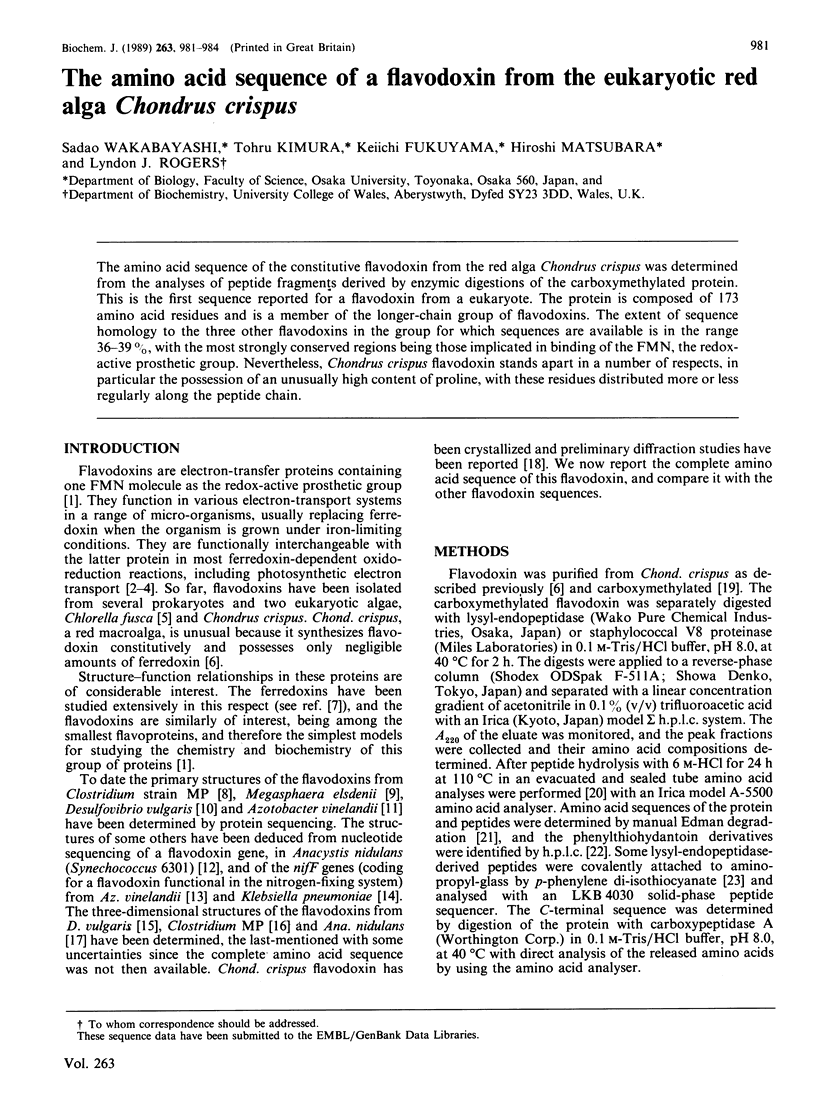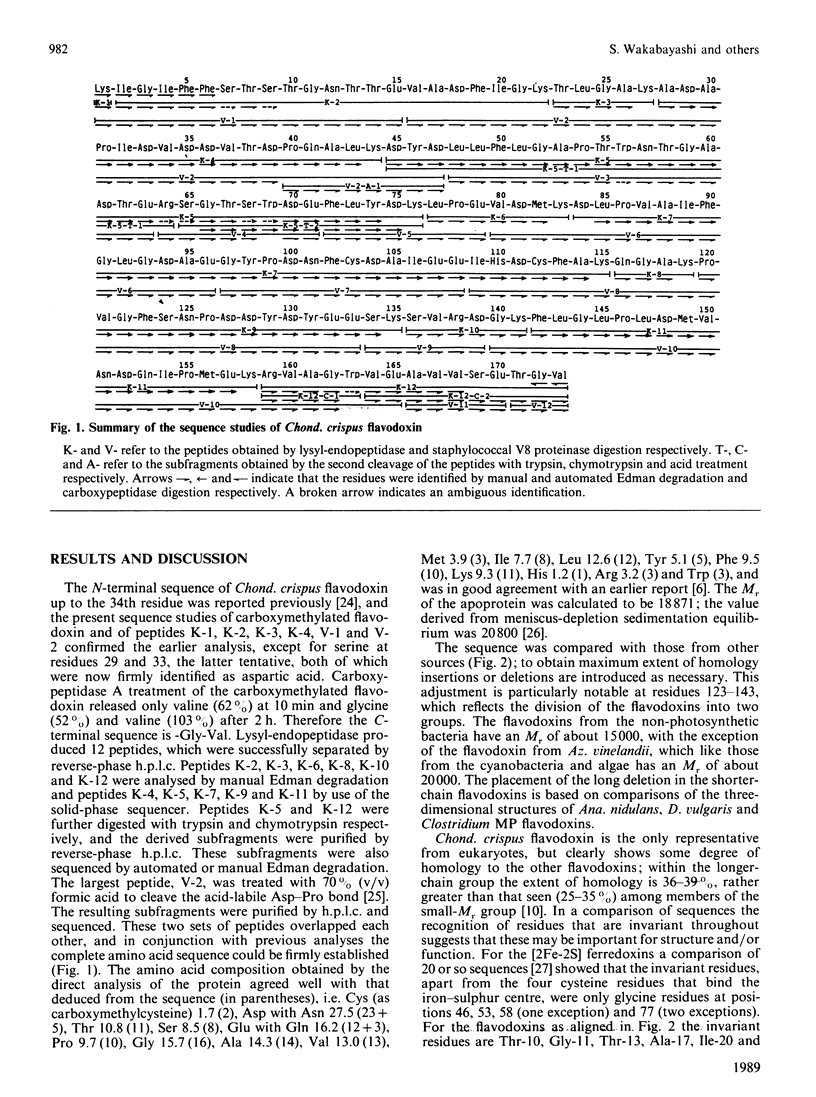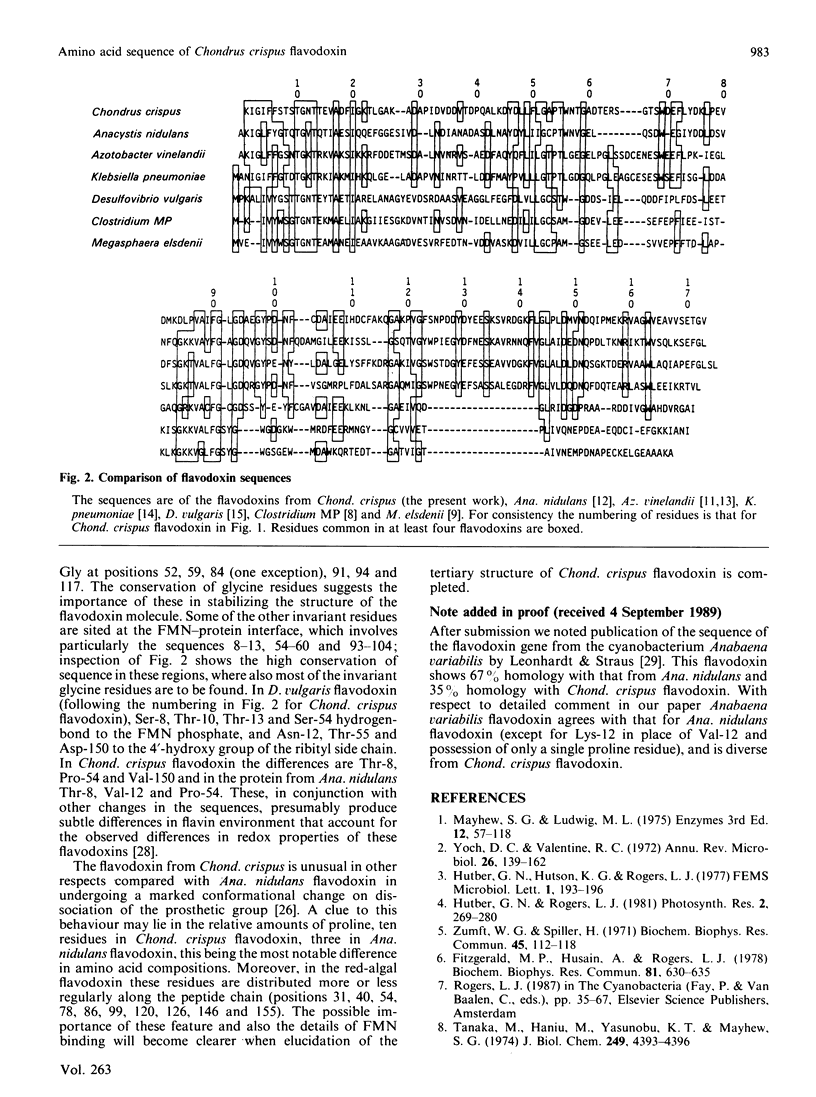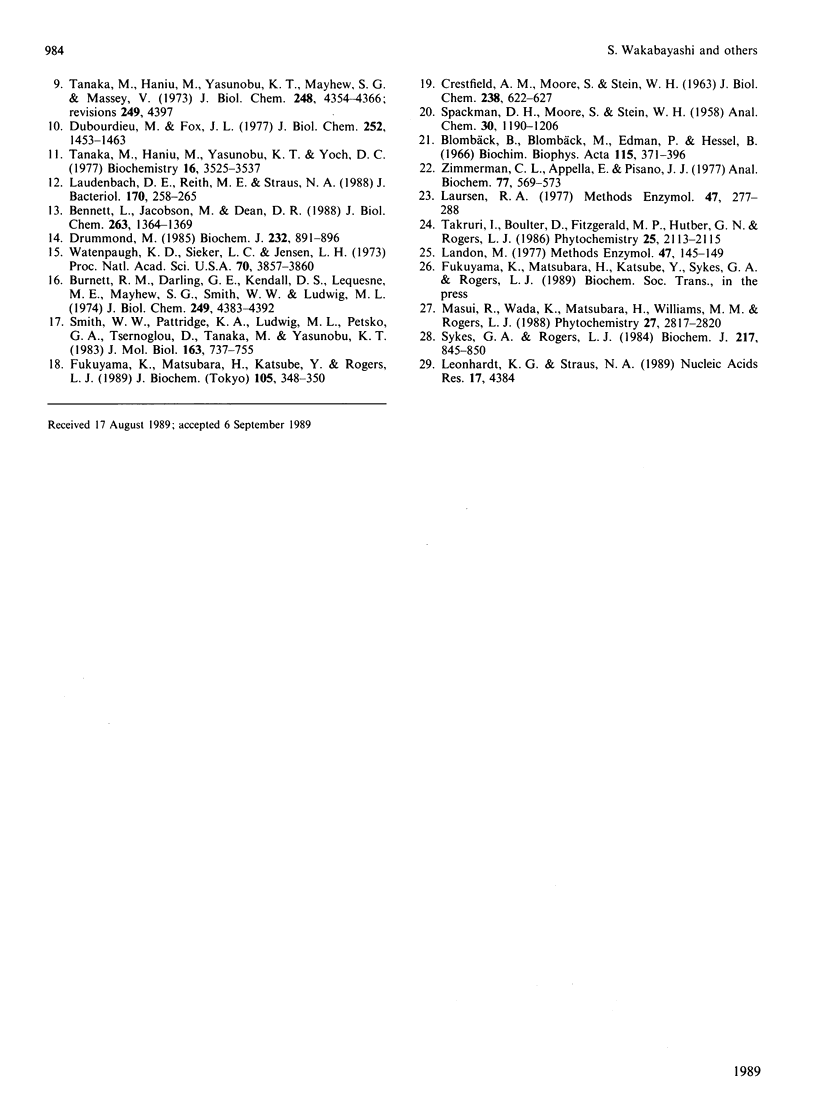Abstract
The amino acid sequence of the constitutive flavodoxin from the red alga Chondrus crispus was determined from the analyses of peptide fragments derived by enzymic digestions of the carboxymethylated protein. This is the first sequence reported for a flavodoxin from a eukaryote. The protein is composed of 173 amino acid residues and is a member of the longer-chain group of flavodoxins. The extent of sequence homology to the three other flavodoxins in the group for which sequences are available is in the range 36-39%, with the most strongly conserved regions being those implicated in binding of the FMN, the redox-active prosthetic group. Nevertheless, Chondrus crispus flavodoxin stands apart in a number of respects, in particular the possession of an unusually high content of proline, with these residues distributed more or less regularly along the peptide chain.
Full text
PDF



Selected References
These references are in PubMed. This may not be the complete list of references from this article.
- Bennett L. T., Jacobson M. R., Dean D. R. Isolation, sequencing, and mutagenesis of the nifF gene encoding flavodoxin from Azotobacter vinelandii. J Biol Chem. 1988 Jan 25;263(3):1364–1369. [PubMed] [Google Scholar]
- Blombäck B., Blombäck M., Edman P., Hessel B. Human fibrinopeptides. Isolation, characterization and structure. Biochim Biophys Acta. 1966 Feb 28;115(2):371–396. doi: 10.1016/0304-4165(66)90437-5. [DOI] [PubMed] [Google Scholar]
- Burnett R. M., Darling G. D., Kendall D. S., LeQuesne M. E., Mayhew S. G., Smith W. W., Ludwig M. L. The structure of the oxidized form of clostridial flavodoxin at 1.9-A resolution. J Biol Chem. 1974 Jul 25;249(14):4383–4392. [PubMed] [Google Scholar]
- CRESTFIELD A. M., MOORE S., STEIN W. H. The preparation and enzymatic hydrolysis of reduced and S-carboxymethylated proteins. J Biol Chem. 1963 Feb;238:622–627. [PubMed] [Google Scholar]
- Drummond M. H. The base sequence of the nifF gene of Klebsiella pneumoniae and homology of the predicted amino acid sequence of its protein product to other flavodoxins. Biochem J. 1985 Dec 15;232(3):891–896. doi: 10.1042/bj2320891. [DOI] [PMC free article] [PubMed] [Google Scholar]
- Dubourdieu M., Fox J. L. Amino acid sequence of Desulfovibrio vulgaris flavodoxin. J Biol Chem. 1977 Feb 25;252(4):1453–1463. [PubMed] [Google Scholar]
- Fitzgerald M. P., Husain A., Rogers L. J. A constitutive flavodoxin from a eukaryotic alga. Biochem Biophys Res Commun. 1978 Mar 30;81(2):630–635. doi: 10.1016/0006-291x(78)91582-6. [DOI] [PubMed] [Google Scholar]
- Fukuyama K., Matsubara H., Katsube Y., Rogers L. J. Crystallization and preliminary X-ray diffraction studies of oxidized flavodoxin from Chondrus crispus, a red alga. J Biochem. 1989 Mar;105(3):348–350. doi: 10.1093/oxfordjournals.jbchem.a122666. [DOI] [PubMed] [Google Scholar]
- Landon Cleavage at aspartyl-prolyl bonds. Methods Enzymol. 1977;47:145–149. doi: 10.1016/0076-6879(77)47017-4. [DOI] [PubMed] [Google Scholar]
- Laudenbach D. E., Reith M. E., Straus N. A. Isolation, sequence analysis, and transcriptional studies of the flavodoxin gene from Anacystis nidulans R2. J Bacteriol. 1988 Jan;170(1):258–265. doi: 10.1128/jb.170.1.258-265.1988. [DOI] [PMC free article] [PubMed] [Google Scholar]
- Laursen R. A. Coupling techniques in solid-phase sequencing. Methods Enzymol. 1977;47:277–288. doi: 10.1016/0076-6879(77)47032-0. [DOI] [PubMed] [Google Scholar]
- Leonhardt K. G., Straus N. A. Sequence of the flavodoxin gene from Anabaena variabilis 7120. Nucleic Acids Res. 1989 Jun 12;17(11):4384–4384. doi: 10.1093/nar/17.11.4384. [DOI] [PMC free article] [PubMed] [Google Scholar]
- Smith W. W., Pattridge K. A., Ludwig M. L., Petsko G. A., Tsernoglou D., Tanaka M., Yasunobu K. T. Structure of oxidized flavodoxin from Anacystis nidulans. J Mol Biol. 1983 Apr 25;165(4):737–753. doi: 10.1016/s0022-2836(83)80277-0. [DOI] [PubMed] [Google Scholar]
- Sykes G. A., Rogers L. J. Redox potentials of algal and cyanobacterial flavodoxins. Biochem J. 1984 Feb 1;217(3):845–850. doi: 10.1042/bj2170845. [DOI] [PMC free article] [PubMed] [Google Scholar]
- Tanaka M., Haniu M., Yasunobu K. T., Mayhew S., Massey V. The primary structure of Peptostreptococcus elsdenii flavodoxin. J Biol Chem. 1973 Jun 25;248(12):4354–4366. [PubMed] [Google Scholar]
- Tanaka M., Haniu M., Yasunobu K. T., Yoch D. C. Complete amino acid sequence of azotoflavin, a flavodoxin from Azotobacter vinelandii. Biochemistry. 1977 Aug 9;16(16):3525–3537. doi: 10.1021/bi00635a005. [DOI] [PubMed] [Google Scholar]
- Tanka M., Haniu M., Yasunobu F., Mayhew S. G. The amino acid sequence of the Clostridium MP flavodoxin. J Biol Chem. 1974 Jul 25;249(14):4393–4396. [PubMed] [Google Scholar]
- Watenpaugh K. D., Sieker L. C., Jensen L. H. The binding of riboflavin-5'-phosphate in a flavoprotein: flavodoxin at 2.0-Angstrom resolution. Proc Natl Acad Sci U S A. 1973 Dec;70(12):3857–3860. doi: 10.1073/pnas.70.12.3857. [DOI] [PMC free article] [PubMed] [Google Scholar]
- Yoch D. C., Valentine R. C. Ferredoxins and flavodoxins of bacteria. Annu Rev Microbiol. 1972;26:139–162. doi: 10.1146/annurev.mi.26.100172.001035. [DOI] [PubMed] [Google Scholar]
- Zimmerman C. L., Appella E., Pisano J. J. Rapid analysis of amino acid phenylthiohydantoins by high-performance liquid chromatography. Anal Biochem. 1977 Feb;77(2):569–573. doi: 10.1016/0003-2697(77)90276-7. [DOI] [PubMed] [Google Scholar]
- Zumft W. G., Spiller H. Characterization of a flavodoxin from the green alga Chlorella. Biochem Biophys Res Commun. 1971 Oct 1;45(1):112–118. doi: 10.1016/0006-291x(71)90057-x. [DOI] [PubMed] [Google Scholar]


